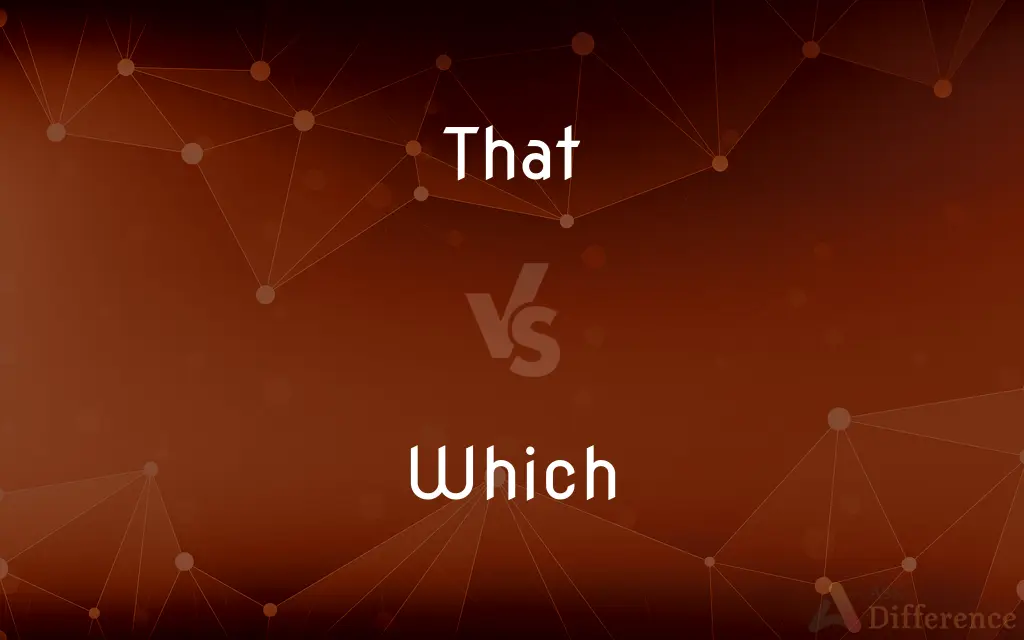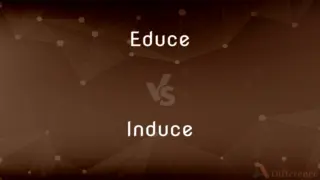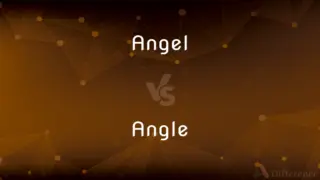That vs. Which — What's the Difference?
By Tayyaba Rehman — Updated on October 3, 2023
"That" introduces essential clauses, while "which" introduces non-essential clauses; both are relative pronouns.

Difference Between That and Which
Table of Contents
ADVERTISEMENT
Key Differences
In English grammar, both "that" and "which" serve as relative pronouns, but their usage differs considerably. "That" is employed to introduce restrictive clauses, which provide essential information to the meaning of the sentence. Without such clauses, the core intent of a sentence might be lost. On the contrary, "which" introduces non-restrictive or parenthetical clauses that offer additional, often optional, details.
If you remove these clauses, the central message of the sentence remains intact. The distinction between "that" and "which" is pivotal for clear and precise communication. While both words can refer to objects, only "that" can refer to people, animals, and things. Moreover, "which" is typically accompanied by commas, signaling its supplementary nature.
To illustrate, "Cars that are red go faster" implies that only red cars go faster. In contrast, "Cars, which are expensive, are a luxury" means all cars are expensive and a luxury, not just specific ones.
Hence, understanding the nuances between "that" and "which" can transform the subtle implications of a statement.
Comparison Chart
Type of Clause
Restrictive (essential)
Non-restrictive (non-essential)
ADVERTISEMENT
Usage
Introduces essential information
Introduces additional, often optional, details
Commas
Typically not used with commas
Often used with commas
Reference
Can refer to people, animals, and things
Refers to things and sometimes animals; not people
Example Sentence
I love the dress that you wore yesterday.
My new car, which is red, is really fast.
Compare with Definitions
That
A relative pronoun introducing essential information.
The book that I read was intriguing.
Which
Used to specify one in a particular category.
Decide which route to take.
That
Referring to a previously mentioned item.
The results of the test, that we took last week, are out.
Which
Referring to a previously mentioned item in context.
I lost my ring, which was a gift from my grandmother.
That
Indicating a specific thing among several.
Among all the cakes, that one is my favorite.
Which
A relative pronoun introducing non-essential information.
The garden, which is quite large, has many flowers.
That
The function word that is used in the English language for several grammatical purposes.These include: as a complementizer/subordinating conjunction. ("He asked that she go.") That can be omitted when used to introduce a subordinate clause—"he told me that it is a good read" could just as easily be "he told me it is a good read".
Which
Introducing a clause where the antecedent is specified.
This is the book, the author of which is unknown.
That
Being the one singled out, implied, or understood
That place.
Those mountains.
Which
What particular one or ones of a number of things or people
Which part of town do you mean?.
That
Being the one further removed or less obvious
That route is shorter than this one.
Which
Any one or any number of; whichever
Use which door you please.
That
To such an extent or degree
Is your problem that complicated?.
Which
Being the one or ones previously mentioned or implied
It started to rain, at which point we ran.
That
To a high degree; very
Didn't take what he said that seriously.
Which
(interrogative) What, of those mentioned or implied.
Which song shall we play?
They couldn't decide which song to play.
Which one is bigger?
Show me which one is bigger.
That
Used to introduce a noun clause that is usually the subject or object of a verb or a predicate nominative
"That contemporary American English is exuberantly vigorous is undeniable" (William Arrowsmith).
Which
The/Any ... that; whichever.
You may go which way you please.
That
Used to introduce a subordinate clause stating a result, wish, purpose, reason, or cause
She hoped that he would arrive on time. He was saddened that she felt so little for him.
Which
Designates the one(s) previously mentioned.
He once owned a painting of the house, which painting would later be stolen.
Yesterday, I met three men with long beards, which men I remember vividly.
For several seconds he sat in silence, during which time the tea and sandwiches arrived.
I'm thinking of getting a new car, in which case I'd get a red one.
That
Used to introduce an anticipated subordinate clause following the expletive it occurring as subject of the verb
It is true that dental work is expensive.
Which
(interrogative) What one or ones (of those mentioned or implied).
Which is which?
By now, you must surely know which is which.
Which is bigger, the red one or the blue one?
I'm unable to determine which is bigger.
Which of these do you want to keep?
That
Used to introduce a subordinate clause modifying an adverb or adverbial expression
Will go anywhere that they are welcome.
Which
The/Any ones that; whichever.
Please take which you please.
That
Used to introduce a subordinate clause that is joined to an adjective or noun as a complement
Was sure that she was right.
Persists in the belief that rates will rise soon.
Which
(relative) Introduces a relative clause giving further information about something previously mentioned.
He walked by a door with a sign, which read: PRIVATE OFFICE.
I found my camera, which I thought I'd lost, under the bed.
No art can be properly understood apart from the culture of which it is a part.
He had to leave, which was very difficult.
That
Used to introduce an elliptical exclamation of desire
Oh, that I were rich!.
Which
Used of people (now generally whom, that; which remains possible with words also referred to by it like baby, child).}}
That
Introducing a clause which is the subject or object of a verb (such as one involving reported speech), or which is a complement to a previous statement.
He told me that the book is a good read.
I believe that it is true. — She is convinced that he is British.
That she will come is almost certain.
Which
Of what sort or kind; what; what a; who.
And which they weren and of what degree.
That
Introducing a subordinate clause expressing a reason or cause: because, in that.
Be glad that you have enough to eat.
Which
A relative pronoun, used esp. in referring to an antecedent noun or clause, but sometimes with reference to what is specified or implied in a sentence, or to a following noun or clause (generally involving a reference, however, to something which has preceded). It is used in all numbers and genders, and was formerly used of persons.
And when thou fail'st - as God forbid the hour! -Must Edward fall, which peril heaven forfend!
God . . . rested on the seventh day from all his work which he had made.
Our Father, which art in heaven.
The temple of God is holy, which temple ye are.
That
(dated) Introducing a subordinate clause that expresses an aim, purpose, or goal ("final"), and usually contains the auxiliaries may, might, or should: so, so that.
Which
A compound relative or indefinite pronoun, standing for any one which, whichever, that which, those which, the . . . which, and the like; as, take which you will.
Do not they blaspheme that worthy name by the which ye are called?
That
Introducing — especially, but not exclusively, with an antecedent like so or such — a subordinate clause expressing a result, consequence, or effect.
The noise was so loud that she woke up.
The problem was sufficiently important that it had to be addressed.
Which
Used in questions to ask about one among a set.
Which of these apples do you want?
That
Introducing a premise or supposition for consideration: seeing as; inasmuch as; given that; as would appear from the fact that.
That
Introducing a subordinate clause modifying an adverb.
Was John there? — Not that I saw.
How often did she visit him? — Twice that I saw.
That
Introducing an exclamation expressing a desire or wish.
Oh that spring would come!
That
Introducing an exclamation expressing a strong emotion such as sadness or surprise.
That
The (thing, person, idea, etc) indicated or understood from context, especially if more remote physically, temporally or mentally than one designated as "this", or if expressing distinction.
That book is a good read. This one isn't.
That battle was in 1450.
That cat of yours is evil.
That
(demonstrative) The thing, person, idea, quality, event, action, or time indicated or understood from context, especially if more remote geographically, temporally or mentally than one designated as "this", or if expressing distinction.
That's my car over there.
He went home, and after that I never saw him again.
That
The known (thing); used to refer to something just said.
They're getting divorced. What do you think about that?
That
(demonstrative) The aforementioned quality or proposition; used to emphatically affirm or deny a previous statement or question.
The water is so cold! — That it is.
Would you like another piece of cake? — That I would!
We think that you stole the tarts. — That I did not!
That
(relative) (plural that) Which, who; representing a subject, direct object, indirect object, or object of a preposition.
The CPR course that she took really came in handy.
The house that he lived in was old and dilapidated.
That
(colloquial) Used in place of relative adverbs such as where or when; often omitted.
The place that [= where or to which] I went last year
The last time that [= when] I went to Europe
That
Clipping of that is; used to reinforce the preceding assertion or statement.
That's proper funny, that.
That
(degree) To a given extent or degree.
"The ribbon was that thin." "I disagree, I say it was not that thin, it was thicker... or maybe thinner..."
That
(degree) To a great extent or degree; very, particularly in negative constructions.
I'm just not that sick.
I did the run last year, and it wasn't that difficult.
That
To such an extent; so. in positive constructions.
Ooh, I was that happy I nearly kissed her.
That
(philosophy) Something being indicated that is there; one of those.
That
As a demonstrative pronoun (pl. Those), that usually points out, or refers to, a person or thing previously mentioned, or supposed to be understood. That, as a demonstrative, may precede the noun to which it refers; as, that which he has said is true; those in the basket are good apples.
The early fame of Gratian was equal to that of the most celebrated princes.
That be far from thee, to do after this manner, to slay the righteous with the wicked.
And when Moses heard that, he was content.
I will know your business, Harry, that I will.
Two principles in human nature reign;Self-love, to urge, and Reason, to restrain;Nor this a good, nor that a bad we call.
If the Lord will, we shall live, and do this or that.
That
As an adjective, that has the same demonstrative force as the pronoun, but is followed by a noun.
It shall be more tolerable for Sodom and Gomorrah in the day of judgment, than for that city.
The woman was made whole from that hour.
Upon a day out riden knightes two . . . That one of them came home, that other not.
That
As a relative pronoun, that is equivalent to who or which, serving to point out, and make definite, a person or thing spoken of, or alluded to, before, and may be either singular or plural.
He that reproveth a scorner getteth to himself shame.
A judgment that is equal and impartial must incline to the greater probabilities.
We speak that we do know, and testify that we have seen.
That I have done it is thyself to wite [blame].
The ship that somebody was sailing in.
I saw to-day a corpse yborn to churchThat now on Monday last I saw him wirche [work].
That that dieth, let it die; and that that is to cut off, let it be cut off.
That
As a conjunction, that retains much of its force as a demonstrative pronoun.
That
To introduce a clause employed as the object of the preceding verb, or as the subject or predicate nominative of a verb.
She tells them 't is a causeless fantasy,And childish error, that they are afraid.
I have shewed before, that a mere possibility to the contrary, can by no means hinder a thing from being highly credible.
That
As adverb: To such a degree; so; as, he was that frightened he could say nothing.
With singing, laughing, ogling, and all that.
The rank is but the guinea's stamp,The man's the gowd [gold] for a'that.
That
To introduce, a reason or cause; - equivalent to for that, in that, for the reason that, because.
He does hear me;And that he does, I weep.
That
To introduce a purpose; - usually followed by may, or might, and frequently preceded by so, in order, to the end, etc.
These things I say, that ye might be saved.
To the end that he may prolong his days.
That
To introduce a consequence, result, or effect; - usually preceded by so or such, sometimes by that.
The birds their notes renew, and bleating herdsAttest their joy, that hill and valley rings.
He gazed so longThat both his eyes were dazzled.
So wept Duessa until eventide,That shining lamps in Jove's high course were lit.
Is not this the dayThat Hermia should give answer of her choice?
That
In an elliptical sentence to introduce a dependent sentence expressing a wish, or a cause of surprise, indignation, or the like.
Ha, cousin Silence, that thou hadst seen that that this knight and I have seen!
O God, that right should thus overcome might!
To try if that our own be ours or no.
When he had carried Rome and that we lookedFor no less spoil than glory.
That
Demonstrative pronoun indicating a specific item.
That is my pen over there.
That
Used to introduce a clause.
I believe that you can do it.
Common Curiosities
Can "that" be used to indicate a specific object?
Yes, "that" can also function as a demonstrative pronoun, as in "That is my car."
Can "which" refer to people?
Typically, "which" refers to things and sometimes animals, not people.
Are "that" and "which" interchangeable?
Not always. "That" introduces essential clauses, and "which" introduces non-essential clauses.
Should "which" always be used with commas?
"Which" is often paired with commas when introducing non-essential information.
Is it incorrect to use "which" in place of "that" for restrictive clauses?
While common in British English, in American English it's preferred to use "that" for restrictive clauses.
Can "that" be used without an antecedent?
No, "that" always relates to a specific antecedent in a sentence.
Why is it important to differentiate between "that" and "which"?
Proper usage ensures clarity and precision in sentences.
Can "that" introduce a non-restrictive clause?
No, "that" is typically used for restrictive (essential) clauses.
How do I know when to use "that" or "which"?
Consider if the information is essential (use "that") or additional (use "which").
Can both words be used in questions?
"Which" is commonly used in questions, e.g., "Which book?". "That" is not typically used in this manner.
Share Your Discovery

Previous Comparison
Educe vs. Induce
Next Comparison
Angel vs. AngleAuthor Spotlight
Written by
Tayyaba RehmanTayyaba Rehman is a distinguished writer, currently serving as a primary contributor to askdifference.com. As a researcher in semantics and etymology, Tayyaba's passion for the complexity of languages and their distinctions has found a perfect home on the platform. Tayyaba delves into the intricacies of language, distinguishing between commonly confused words and phrases, thereby providing clarity for readers worldwide.















































